 Petzlover
Petzlover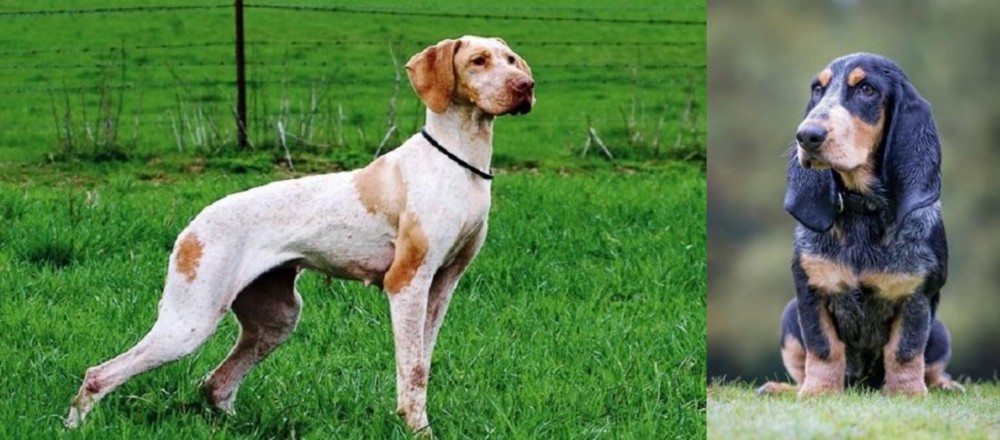 Both Ariege Pointer and Petit Bleu de Gascogne are originated from France. Ariege Pointer may grow 9 cm / 4 inches higher than Petit Bleu de Gascogne. Ariege Pointer may weigh 10 kg / 23 pounds more than Petit Bleu de Gascogne. Both Ariege Pointer and Petit Bleu de Gascogne has almost same life span. Both Ariege Pointer and Petit Bleu de Gascogne has almost same litter size. Both Ariege Pointer and Petit Bleu de Gascogne requires Low Maintenance.
Both Ariege Pointer and Petit Bleu de Gascogne are originated from France. Ariege Pointer may grow 9 cm / 4 inches higher than Petit Bleu de Gascogne. Ariege Pointer may weigh 10 kg / 23 pounds more than Petit Bleu de Gascogne. Both Ariege Pointer and Petit Bleu de Gascogne has almost same life span. Both Ariege Pointer and Petit Bleu de Gascogne has almost same litter size. Both Ariege Pointer and Petit Bleu de Gascogne requires Low Maintenance.
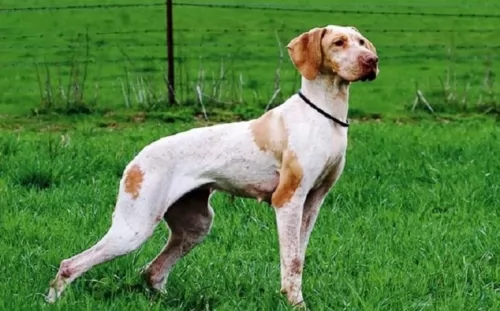 The Ariege Pointer is a French hunting dog, coming from the Ariegeois region of France.
The Ariege Pointer is a French hunting dog, coming from the Ariegeois region of France.
Known as the Ariege Pointing Dog, French Pointer or Braque de l’Ariege, these dogs came from the old French Braque dogs that were crossed with the orange and white Southern Braques.
It was in 1990 that a team of breeders decided to devote themselves to the breed’s survival. The Braque de l’Ariege was recognized by the United Kennel Club in 2006.
 The Petit Bleu de Gascogne is a scenthound dog originating in France where he has always been used as a hunting dog.
The Petit Bleu de Gascogne is a scenthound dog originating in France where he has always been used as a hunting dog.
The Petit Bleu de Gascogne is a descendant of the Grand Bleu de Gascogne. This dog was developed around the 16th century already, with the numbers of the dog being reduced at the time of the World Wars.
They’re quite well known in France, but not in any other parts of the world. The dog is an official member of the UKC, and it was in 1991 that the dog joined their scent hound group.
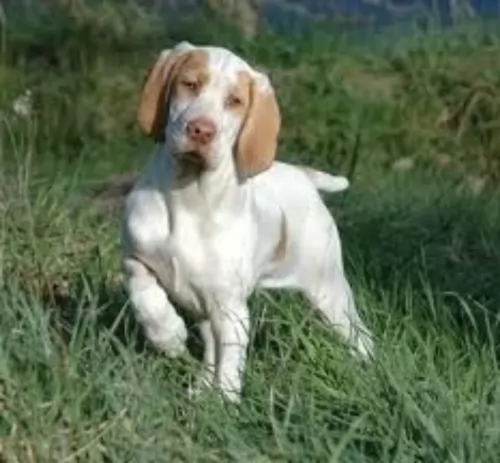 The Ariege Pointer has always been a dog kept essentially for hunting and not as a companion dog. He stands between 55 – 67cm and weighs 25 – 30kg.
The Ariege Pointer has always been a dog kept essentially for hunting and not as a companion dog. He stands between 55 – 67cm and weighs 25 – 30kg.
He is an attractive looking dog with quite a large head while the body is sleek and slender to look at. The ears are quite large and are floppy while the tail is traditionally docked to give him that distinctive look. These days the tail is often left long and hangs downwards.
The coat is short, single and rough and is white with tan or orange patches. The coat can also be speckled or ticked.
The Ariege Pointer is a hunting dog who is friendly towards strangers and therefore won’t make a particularly good watchdog.
These dog are lively, independent and good natured and they make excellent companion dogs. They are fairly docile and and get on well with children and pets in the home. Just like with any other dog, they need to be trained and socialized early.
 The Petit Bleu de Gascogne is a medium to large sized dog which stands at between 52 to 58cm in height at the withers and weighs in the region of 18 to 22kg.
The Petit Bleu de Gascogne is a medium to large sized dog which stands at between 52 to 58cm in height at the withers and weighs in the region of 18 to 22kg.
In fact, the only difference between the Petit Bleu de Gascogne and the original Bleu de Gascogne is its size. They’re well proportioned dogs and they have lean, muscular bodies. The head is long and slim, the nose black, the expression gentle and unthreatening.
Most times you’ll find a black patch on each side of the head which extends to the ears so that the ears are essentially black. The patch also extends to around the eyes.
The dense, short coat is a typical trademark feature, with the color of the coat being white mottled with black so that the general appearance is a slate blue color. The dog usually has tan eyebrows over each eye. The tail is long and the ears long and floppy.
Kept essentially as a pet today, the Petit Bleu de Gascogne has kept its hunting instincts and is an excellent scent-dog, being able to follow a scent for miles. It is why you want to ensure that as a pet, you take him on regular walks, every day in fact. He just loves to get out, and given the chance to run and chase a scent.
Apart from his hunting skills, he still makes an excellent pet, being loyal and loving with his human family. He is looked upon as being amicable and well-balanced, getting on well with children as well as dogs in the home.
They’re quite laid-back and friendly, so they don’t make particularly good watchdogs. They are independent and intelligent and will respond well to training and socialization.
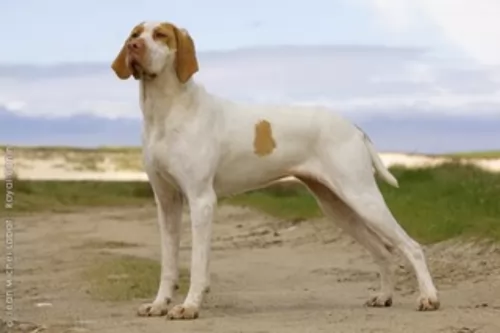 The Ariege Pointer has always been an excellent pointing- and hunting dog. When it comes to being a family pet, he puts his hunting skills aside and becomes a loyal, loving, friendly pet.
The Ariege Pointer has always been an excellent pointing- and hunting dog. When it comes to being a family pet, he puts his hunting skills aside and becomes a loyal, loving, friendly pet.
They are considered to be rare dogs, and were at one time bordering on extinction. Those who have owned one of these hunting dogs will be glad to know that they are no longer considered endangered. They’re not your friendly, social kind of dog that you find in other dog breeds, but with training and socialization he will make a fine companion and family friend.
 The Petit Bleu de Gascogne just loves being outdoors, chasing the scent of something interesting. He is in his element outside as a hunting or tracking dog.
The Petit Bleu de Gascogne just loves being outdoors, chasing the scent of something interesting. He is in his element outside as a hunting or tracking dog.
Training and socialization will always be a good idea for these dogs, as once on the scent he may be inclined to ignore your calls and not return easily.
They’re easy-going dogs, loving be around their human family. Provide well for him and you will find that he makes an amicable, loyal and devoted companion.
 The Ariege Pointer is a working dog breed, used for hunting and retrieving prey. With good care the dog can live to be a good 12 – 15 years of age.
The Ariege Pointer is a working dog breed, used for hunting and retrieving prey. With good care the dog can live to be a good 12 – 15 years of age.
However, with every dog breed there are common dog diseases to watch for. This dog has long floppy ears and these can get damp and will need to be cleaned and dried regularly otherwise the long ears can be prone to infection.
Apart from being prone to health issues such as an ear infection, you want to be aware of very common dog ailments such as hip dysplasia which can cause lameness in your dog.
Whatever illness your dog has, and you see he isn’t acting his usual self, get him to the vet for a check-up and then make sure that all treatment and medication prescribed is adhered to.
 The Petit Bleu de Gascogne is a healthy dog with no unusual health problems being documented. With good care, he can generally live to be 11, 12 or 13 years of age. Nonetheless it is a good idea to be aware of some of the horrible dog illnesses that can strike, even though it is highly unlikely.
The Petit Bleu de Gascogne is a healthy dog with no unusual health problems being documented. With good care, he can generally live to be 11, 12 or 13 years of age. Nonetheless it is a good idea to be aware of some of the horrible dog illnesses that can strike, even though it is highly unlikely.
Your Petit Bleu de Gascogne is a deep chested dog and this simply means it can develop bloat. A swollen stomach, lethargy and trying to vomit are just some of the signs of this ailment which can become deadly if not attended to. The stomach can twist with bloat and this is when things get serious.
Floppy eared dogs are always at risk of ear infections and these can be painful for your pet. You will notice him scratching at his ears or shaking his head and then its time to investigate further for redness or discharge.
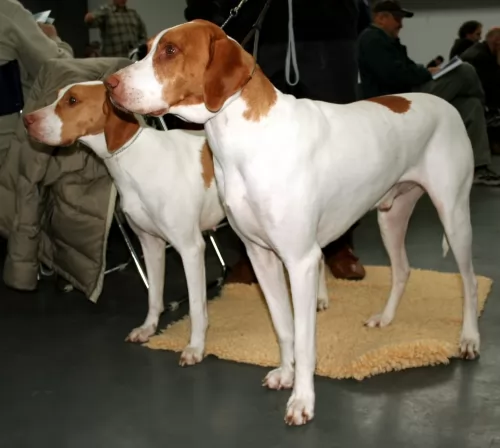 Your attractive Ariege Pointer will give birth to 2 – 8 puppies. If you don’t want puppies, then spaying or neutering is excellent and can actually have many health benefits for your pet.
Your attractive Ariege Pointer will give birth to 2 – 8 puppies. If you don’t want puppies, then spaying or neutering is excellent and can actually have many health benefits for your pet.
This dog with its short coat requires very little maintenance, and a good brush twice a week will ensure the coat remains glossy and shiny, giving you the chance to also check for fleas and ticks.
Don’t just assume every dog has bad breath. Bad breath can be indicative of dental disease, and dental problems can cause all kinds of other illnesses within the body. Make sure that while your pet’s teeth are healthy, that you brush them 2 or 3 times a week with special canine toothbrush and toothpaste.
The Ariege Pointer requires regular exercise as it is a lively, energetic dog. He can adapt to life in the city or the country, but ideally he needs a place with a large garden.
Wherever you keep him as a pet, make sure you take him for walks every day and that you play ball- or rope games with him. Ignoring his exercise needs will turn him into a bored, frustrated pet, and that isn’t fair towards him.
Make sure you choose good quality commercially manufactured foods for him. Adding in some home-made food to his kibble such as cooked brown rice, vegetables and chicken will be wonderfully good for him.
Every dog will require some raw meat added into his diet from time to time. Many skin diseases can be treated by adding in raw meat. After all, before dogs were domesticated they lived on raw meat, and including this ingredient back into their diet guarantees to make a remarkable difference in terms of good health.
 Luckily the Petit Bleu de Gascogne is a fairly low maintenance dog who will basically require a good brush twice a week to rid him of loose hairs and to keep his coat nice and shiny.
Luckily the Petit Bleu de Gascogne is a fairly low maintenance dog who will basically require a good brush twice a week to rid him of loose hairs and to keep his coat nice and shiny.
Take the time while brushing him to test for any unusual lumps on his body. Check inside his ears too, because as a floppy eared dog, there can be a build-up of wax, debris and dampness and these can all cause bacteria and an ear infection.
Check his eyes too as well as inside his mouth. He can’t tell you when he’s got terrible tooth ache from a rotting tooth and you need to check for this. Bad teeth can cause all kinds of health issues.
There are some excellent commercially manufactured dog foods on the market which have got the vitamins and minerals your pet needs. Some of the lower quality foods have got bad ingredients such as colorants and fillers and these can actually be toxic for your pet.
It’s always wise to add a little bit of home-made food into your pet’s diet and then simple, nutritious foods such as boiled chicken, brown rice or pasta, sweet potatoes, carrots and spinach can do him the world of good. Just chop it up and add it into the dried kibble every other night when you feed your pet. A bit of raw meat occasionally can also be healthy for him.
Always ensure there’s a bowl of fresh, cool water available to him.
Ensure your pet has a nice comfortable, dry place to sleep.
Never ever leave your pet alone in a hot car.
Make sure your puppy has his puppy vaccines to avoid some life-threatening diseases.
Have your dog spayed or neutered to avoid unwanted puppies.